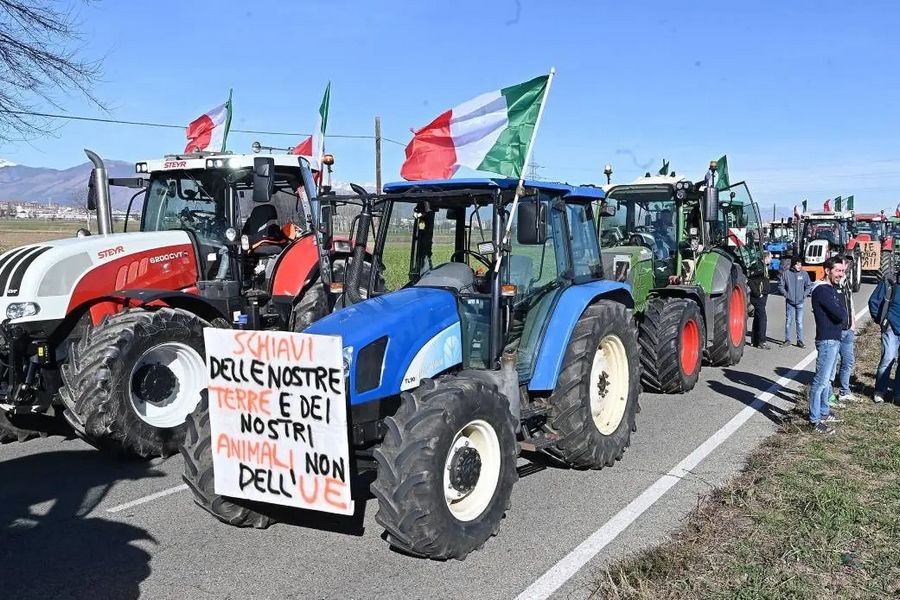THE tractors they block traffic, and invade Rome. There farmers' protest has also arrived in Italy after starting a few weeks ago in Germany. From here it moved on Belgium and in Francebut also in Holland, Portugal And Spain, spreading like wildfire. Not even in theEastern Europe the situation is calm, because even there the farmers are on a war footing with their tractors.
Because there is a tractor protest
But what do the tractor protests coming from various nations have in common? What binds countries so different from each other and with economic ecosystems that work in different ways? Before finding out and going into detail, another reflection is necessary, which takes us back to topics more familiar to us. So one wonders to what extent the environmental policies decided by Europe are actually fair for Europeans, not just for them farmers but also for motorists.
The enemy that unites the latter and the farmers is undoubtedly the CO2: emissions must be reduced to counteract the warming of average earth temperatures and therefore climate change.
The purpose is right, noble and sacrosanct, while the ways to achieve it are, at times, questionable.
Farmers protest against European Union policy
Speaking of agriculture, according to Brussels, emissions must be cut by 2030 of carbon dioxide by 55% compared to 1990 and then reach the climate neutrality by 2050. Obviously all production sectors must contribute to achieving this result: the objective is prevent and reduce pollution caused by large plants, including those livestock: according to the European institutions, the stable should behave like a factory, with all sustainability requirements. However, this request was not welcomed and the rules on intensive cattle farming.
Also the rules on nature restoration, to encourage the reproduction of fauna and pollinating insects (fundamental for plant growth) have been removed from the text. But that's not all, because in November the regulation that aimed to halve the use of pesticides by 2030, while on 6 February the EU formalized the new climate objectives for 2040, which include a 90% cut in emissions compared to 1990, but omitted that 30% for agriculture that was in the initial drafts.
Tractor protest, other reasons
In Italy, then, other protest topics were added, such as the one on prices at origin – when fruit and vegetables arrive at the supermarket they have a mark-up of 300% compared to what is paid to the producer, because the supply chain is very long – or on the distribution of Pac fundswhich in Italy are not assigned equally as expected in Europe.

In all this, at a European level, agriculture is responsible for11% of EU CO2 emissionsa percentage comparable to that of private mobilitywhich totals 12%.
Private mobility under attack
In recent years the issue of limitations to private mobility has become very topical, especially after important measures were confirmed such as that of prohibiting the sale of new vehicles that are not zero emissions by 2035. An elegant way to decree the end of heat enginewithout considering the fact that i electric vehiclesthe only ones who will be able to satisfy this condition, zero emissions are guaranteed only locally.
Europe has not taken into consideration either CO2 generated for their production – on average 70% more than that created by the construction of an internal combustion car – nor that due to the production of electricity necessary to power electric motors. It's a shame that this union between imposition and superficiality is creating many problems for a fundamental industry like the car industry, which is grappling with a transformation not requested by the market, full of unknowns and, for now, only harmful to consumers who experiment crazy prices and product shortages.

At this point one wonders why the car industry has passively accepted all this how much time will still have to pass before exasperated motorists start protesting like farmers.
All the reasons for farmers' protests in Europe and Italy
Cost increase:
- Fuel: the price of agricultural diesel has increased considerably due to the energy crisis, creating a strong impact on production costs.
- Feed: the increase in the cost of feed for farm animals has further weighed on the expenses of agricultural companies.
European policies:
- Green Deal: the measures of the European Green Deal, aimed at the ecological transition, are seen by some farmers as penalizing the sector, with the reduction of some subsidies and the introduction of new, more stringent regulations.
- Foreign competition: Trade agreements with non-EU countries, such as Ukraine and Mercosur, are seen as a threat to the competitiveness of European agricultural products. We import agricultural products from nations where the same parameters as those used in cultivation are not respected.
What the farmers are demanding:
- Cost reduction of agricultural diesel.
- Economic supports: require increased subsidies to offset rising costs and new environmental regulations.
- Greater equity: they protest against unfair competition from products imported from countries with lower production and environmental standards.
- Debureaucratization: they ask for a simplification of bureaucratic procedures for agricultural companies.
- Infrastructure investments: require greater investment to improve rural infrastructure.
- Fairer agricultural policies: they want to be more involved in decisions that affect the future of agriculture.
The situation is complex and requires a constructive dialogue between European and national institutions and farmers to find adequate solutions that guarantee the economic and environmental sustainability of the agricultural sector.
The intervention of theHon. Marco ZanniMember of the European Parliament where he reports the discontent of farmers.
Read also:
→ Read other related topics
→ What do you think? Drop by discussions on the FORUM!
#Tractor #protest #farmers #war #footing